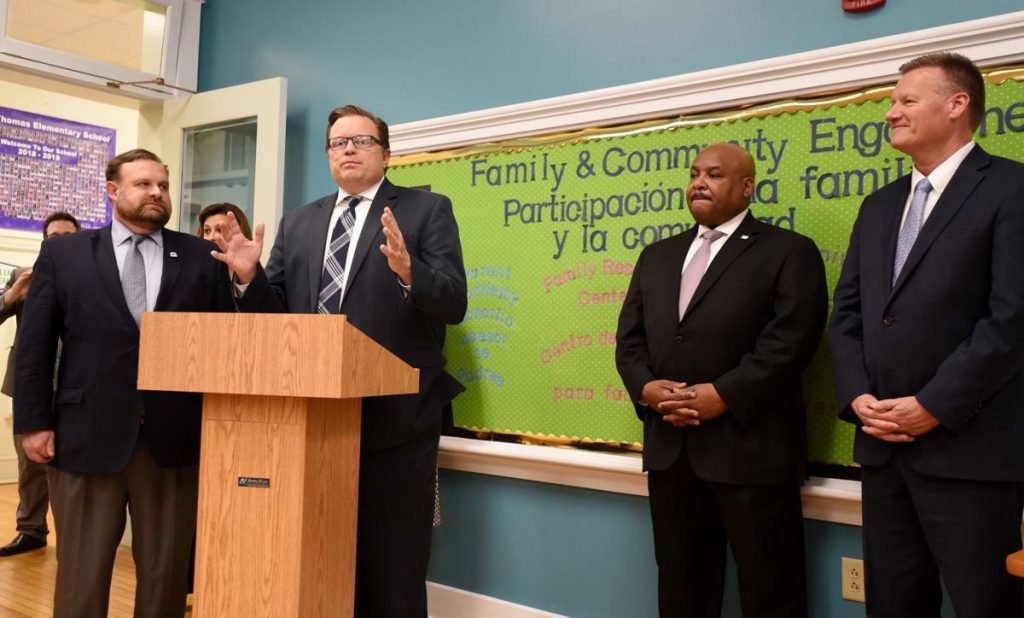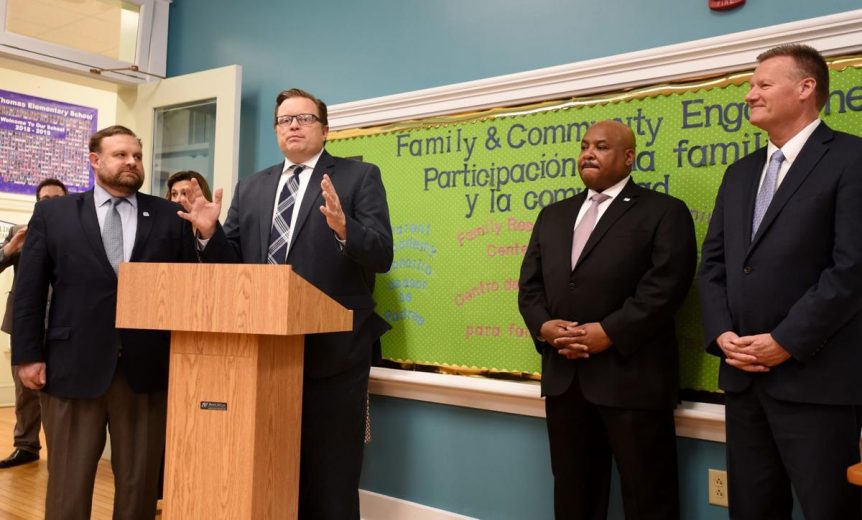RACINE, WI| by Christina Lieffring| May 2, 2019
Original article can be found at: https://journaltimes.com

RACINE — In the not-too-distant future, Julian Thomas Elementary School is set to go beyond educating students, as home to a new health clinic for low-income residents.
At a Wednesday press conference, Mayor Cory Mason said that early in his tenure, Public Health Administrator Dottie Kay Bowersox pointed out that the City of Racine does not have a Federally Qualified Healthcare Center.
Given the city’s size and poverty rate, she thought the city could really use one.
“We’re the biggest city in Wisconsin that doesn’t have one,” Mason said. “One of the biggest in the Midwest that doesn’t have one.”
Federally Qualified Healthcare Centers provide a range of health care services on a sliding fee scale for low-income families on Medicare, Medicaid or who cannot afford their insurance deductible.
New federal health care center could come to Racine
On Wednesday, officials from the city, Racine County, Racine Unified School District and other partners announced that they are teaming up to open a health clinic — with or without a FQHC designation — at Julian Thomas elementary school, 930 Dr. Martin Luther King Jr. Drive.
“To be able to provide health care, not only to the Julian Thomas community but to the Lincoln King Neighborhood and the broader Racine neighborhood is really a wonderful thing to be able to announce today,” Mason said.
Why Julian Thomas?
During her research for the FQHC application, Bowersox looked at factors such as population, the number of people on Medicaid, the number of children receiving free lunches and other services and found that the 53403 and 53404 zip codes were the areas with the most need.
Julian Thomas is set to be Unified’s second community school, which offer programs including school-based mental health services, extended learning programs and programs for families and adults in the school’s immediate neighborhood. Given Julian Thomas’ location, Dr. Eric Gallien said he thought the school would be a good place for the clinic.
“I know that this clinic is going to provide a need for our school community, our families, the broader community, that is really needed,” Gallien said. “To provide health care services that otherwise may not be provided for these families is going to be provided right here.”
Other entities, such as the county, jumped on board. While the clinic will be based in Racine, residents from throughout Racine County would be able to seek treatment there.
“The county is only as strong as its weakest link and if we have under-insured or individuals who don’t have insurance at all or if we have neighborhoods, whether its in the City of Racine or the City of Burlington, who have factions of people who need quality care and there’s no access for them, it falls back on the county,” said County Executive Jonathan Delagrave. “A lot of people here are working and they’re working for $9, $10, $11 (per hour) and they don’t have access to quality insurance. This is going to help mightily.”
Julian Thomas is just down the street from Health Care Network, 904 State St., which plans to relocate to 500 Wisconsin Ave. HCN Executive Director Alison Sergio said she joined the committee to open the clinic because it would be able to help people HCN cannot.
All Saints Foundation makes $100k grant promise to Health Care Network
HCN can only provide services to people who are both low income and uninsured — it cannot treat someone who is uninsured but has an income too high, or has Medicare or Medicaid or is insured but their deductible is too high or the insurance only covers emergencies, not primary care.
“The FQHC is the perfect solution for that because we’re able to partner and have clients go back and forth or be referred from one to the other,” Sergio said. “Whichever is more appropriate for care.”
In addition to primary care, the plan is for the clinic to provide mental health services, dental care and other ancillary health care services.
The numbers
The city submitted its application for an FQHC on April 11 and will learn whether it was approved sometime in August. With the designation comes a $650,000 federal grant and a $288,000 match from the state.
If the city’s application is denied in 2019, Mason said that having the clinic in operation will give it a better chance of receiving the funding should Racine decide to apply again in 2020.
Unified community fund increases from $1.5 million to $5.2 million
The future 5,000 square-foot clinic is set to be located in the lower level of the old Garfield School section of Julian Thomas. Unified has budgeted $900,000 of its community service fund, also known as Fund 80, to transform the space into a clinic. Construction is scheduled to begin this summer.
If it does not receive the grant, the city estimates it will cost approximately $2.5 to $3 million to get the clinic up and running. With the grant, the cost is expected to be $2 million at most. But the numbers depend on whether or not local health care businesses donate equipment to the clinic, something some of them are considering. At Wednesday’s press conference, Mason said the plan is to raise funds from the private sector to cover the remaining costs.
Bowersox said they hope to open the clinic by Jan. 2.
Share this Post













